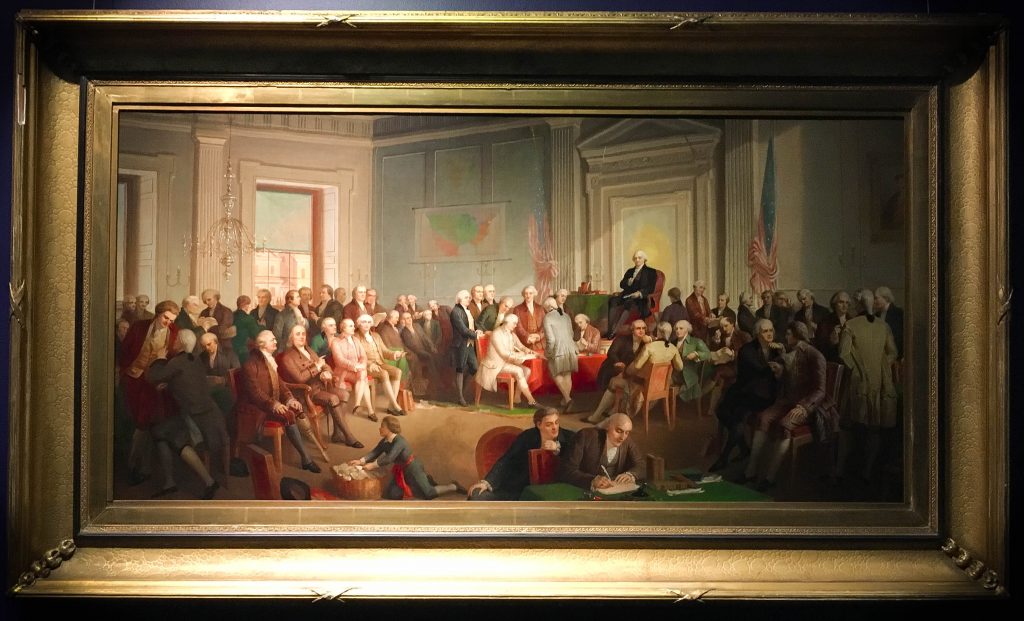The U.S. Constitution restricts what the federal government may spend money on by specifically enumerating its powers:
The Congress shall have Power To lay and collect Taxes, Duties, Imposts and Excises, to pay the Debts and provide for the common Defence and general Welfare of the United States; but all Duties, Imposts and Excises shall be uniform throughout the United States;
To borrow Money on the credit of the United States;
To regulate Commerce with foreign Nations, and among the several States, and with the Indian Tribes;
To establish an uniform Rule of Naturalization, and uniform Laws on the subject of Bankruptcies throughout the United States;
To coin Money, regulate the Value thereof, and of foreign Coin, and fix the Standard of Weights and Measures;
To provide for the Punishment of counterfeiting the Securities and current Coin of the United States;
To establish Post Offices and post Roads;
To promote the Progress of Science and useful Arts, by securing for limited Times to Authors and Inventors the exclusive Right to their respective Writings and Discoveries;
To constitute Tribunals inferior to the supreme Court;
To define and punish Piracies and Felonies committed on the high Seas, and Offences against the Law of Nations;
To declare War, grant Letters of Marque and Reprisal, and make Rules concerning Captures on Land and Water;
To raise and support Armies, but no Appropriation of Money to that Use shall be for
a longer Term than two Years;To provide and maintain a Navy;
To make Rules for the Government and Regulation of the land and naval Forces;
To provide for calling forth the Militia to execute the Laws of the Union, suppress Insurrections and repel Invasions;
To provide for organizing, arming, and disciplining, the Militia, and for governing such Part of them as may be employed in the Service of the United States, reserving to the States respectively, the Appointment of the Officers, and the Authority of training the Militia according to the discipline prescribed by Congress;
To exercise exclusive Legislation in all Cases whatsoever, over such District (not exceeding ten Miles square) as may, by Cession of particular States, and the Acceptance of Congress, become the Seat of the Government of the United States, and to exercise like Authority over all Places purchased by the Consent of the Legislature of the State in which the Same shall be, for the Erection of Forts, Magazines, Arsenals, Dock-Yards, and other needful Buildings; — And
To make all Laws which shall be necessary and proper for carrying into Execution the foregoing Powers, and all other Powers vested by this Constitution in the
Government of the United States, or in any Department or Officer thereof.
As James Madison, remembered as the Father of the Constitution, explained, the specific powers granted the government in order that it might “provide for the common Defence and general Welfare of the United States” are those that are listed immediately following these two objectives and that serve to qualify them.
Thomas Jefferson concurred: “Congress has not unlimited powers to provide for the general welfare, but only those specifically enumerated.”
For roughly 100 years, Constitutional restrictions were followed fairly tightly, though they almost immediately faced challenge.
As early as 1794, Madison wrote disapprovingly of a $15,000 appropriation for French refugees: “I cannot undertake to lay my finger on that article of the Constitution which granted a right to Congress of expending, on objects of benevolence, the money of their constituents.”
The Constitution is the document that both grants and limits the authority of the federal government. As only those federal laws in harmony with the Constitution are legitimate, it is the hinge on which liberty hangs.
Paradoxically, because the document that limits federal power also grants federal power, any attempt to ignore or overthrow its parameters in reckless pursuit of inconsistent legislation actually undermines the legitimacy of the government itself.
If the Constitution’s restrictions on federal power are invalid, so are its grants of authority.
After my misspent youth as a wage worker, I’m having so much more fun as a blogger, helping other discerning travellers plan fun and fascinating journeys. Read more …

